-
-
Yoga Courses
Yoga Teacher Training India
Yoga Teacher Training Canada
Yoga Teacher Training Germany
Yoga Teacher Training Greece
Yoga Teacher Training Portugal
-
Yoga Retreats
-
YTTC Guide
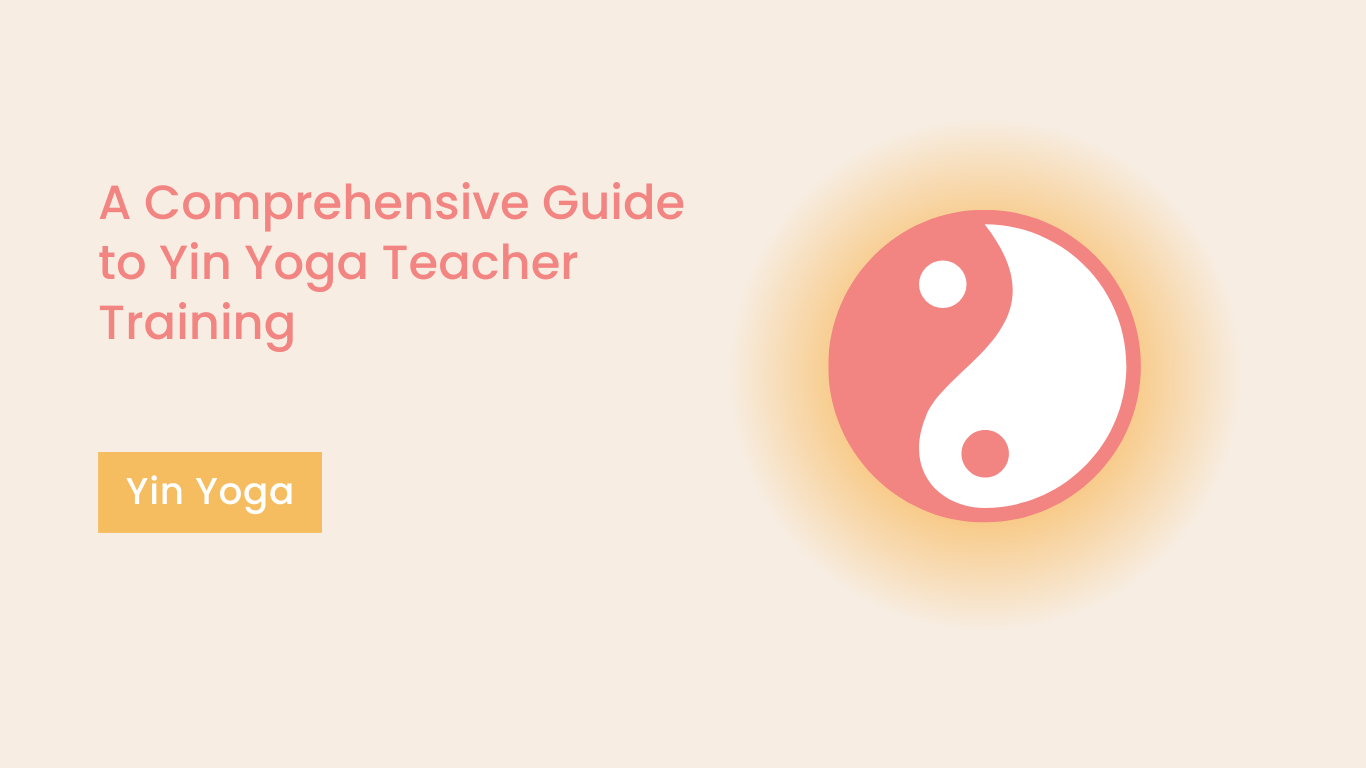
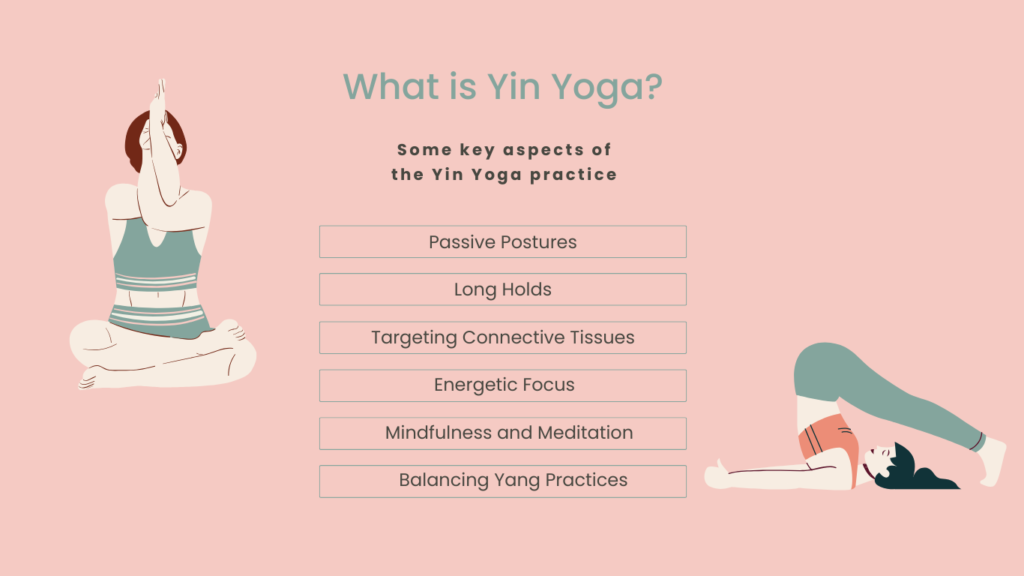
Yin Yoga is a slow-paced style of yoga that emphasizes holding passive poses for an extended period, typically between 3 to 5 minutes or even longer. Yin Yoga focuses on deepening into the stretch by relaxing the muscles, which targets the deeper connective tissues of the body, such as the fascia, ligaments, and joints. This practice is meditative in nature, encouraging mindfulness, introspection, and stillness.
Here are some key aspects of the Yin Yoga practice teaches by the yoga instructors in 50 Hour Yin Yoga teacher Training:
Passive Postures: Yin Yoga postures are generally held on the floor, with the body fully supported and relaxed. The goal is to soften the muscles and allow gravity to deepen the stress in the tissues.
Long Holds: Each posture is held for several minutes, allowing time for the connective tissues to stretch and release tension. This also provides an opportunity to cultivate patience and mindfulness.
Targeting Connective Tissues: By holding poses for longer durations without engaging the muscles, Yin Yoga works on the connective tissues, which can increase flexibility and improve joint mobility.
Energetic Focus: Yin Yoga is linked to the Meridian system of traditional Chinese medicine. The poses stimulate these energy channels, helping to balance the body’s energy flow.
Mindfulness and Meditation: Yin Yoga encourages the practitioners to focus on their breath and observe their thoughts and sensations without judgment. This practice leads to a deeper state of inner awareness and inner understanding.
Balancing Yang Practices: Yin Yoga is a complementary practice to more vigorous, yang-style practices like Vinyasa or Ashtanga Vinyasa Yoga. It helps to create balance by focusing on stillness and passive stressing, countering the active, muscular engagement found in yang practices.
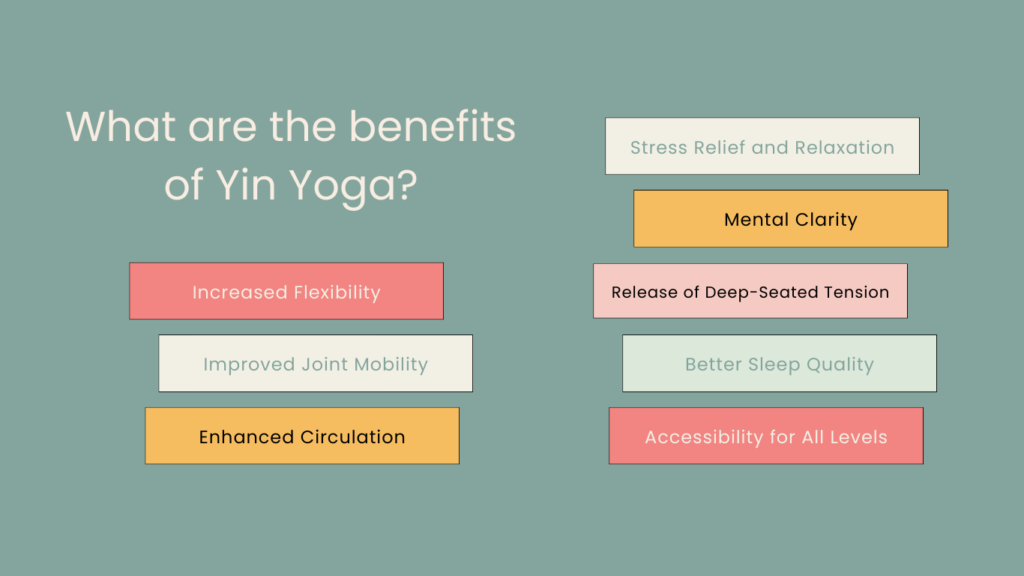
Yin Yoga focuses on holding poses for extended periods, allowing the connective tissues, such as fascia, tendons, and ligaments, to gently stretch. Over time, this can lead to increased flexibility and greater range of motion.
By targeting the deeper connective tissues, Yin Yoga helps maintain and improve joint health. Regular practice can improve joint mobility, making daily movements smoother and more comfortable.
The long holds in Yin Yoga promote better circulation by compressing and releasing different areas of the body. This helps improve blood flow to the tissues, supporting overall cardiovascular health.
Yin Yoga activates the parasympathetic nervous system, which is responsible for rest and relaxation. This helps to reduce stress, anxiety, and tension, leaving practitioners feeling calm and centered.
The slow pace and stillness of Yin Yoga encourage mental clarity, by focusing on the breath and bodily sensations. This can lead to greater self-awareness and a meditative state.
Yin Yoga provides an opportunity to release stored physical and emotional tension. By holding poses for longer durations, you may experience the release of deep-seated emotions and stress, leading to a sense of emotional balance.
The calming effects of Yin Yoga can lead to better sleep quality. Practicing Yin Yoga in the evening can prepare the body and mind for restful sleep by reducing physical and mental tension.
Yin Yoga is accessible to people of all ages and fitness levels. The poses can be modified to suit individual needs, making it a gentle and effective practice for everyone.
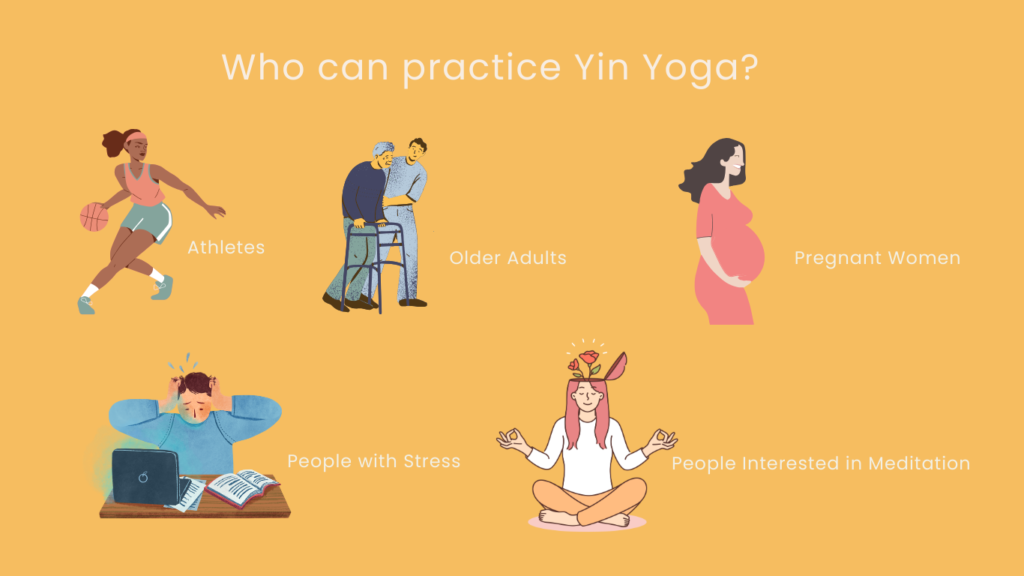
Yin Yoga can be practiced by everyone and is a very accessible Yoga practice, but we still would like to give you an idea who can benefit from the practice of Yin Yoga in particular.
Yin Yoga is a great entry point for those new to Yoga because it involves slow, gentle movements and long-held poses, making it a perfect introduction to the practice.
Athletes and those who engage in high-intensity workouts can benefit from Yin Yoga to improve flexibility, joint mobility, and recovery. It helps balance the effects of strenuous physical activity by focusing on deep stretching and muscular release.
Yin Yoga’s gentle approach is well-suited for older adults, helping maintain and improve joint health, mobility, and balance. The practice can be easily adapted to accommodate any physical limitations.
Those experiencing high levels of stress, anxiety, or burnout may find Yin Yoga particularly beneficial. The meditative nature of the practice promotes relaxation and mental calm, helping to alleviate stress-related symptoms.
Yin Yoga can be modified to accommodate physical limitations, making it accessible for people recovering from injuries or dealing with chronic pain. The emphasis on passive stretching and support through props allows for a safe and therapeutic experience and gentle healing.
Yin Yoga can be used as a tool for stress management and mindfulness. The practice encourages slowing down and focusing on the breath, which can help manage the demands of a hectic lifestyle.
Yin Yoga is ideal for those interested in meditation. The long-held poses provide an opportunity to cultivate a deep sense of awareness, presence, and inner stillness.
Practitioners of more dynamic, Yoga styles like Vinyasa or Ashtanga can benefit from Yin Yoga to balance their routine. Yin Yoga offers a counterbalance to the active, muscular engagement of yang practices, contributing to overall harmony in the body and mind. if you are looking for a Yoga Teacher Training School that offers YTT Course, just check the Anandam Yoga School – A Yoga Alliance certified school.
Pregnant women can practice Yin Yoga with appropriate modifications. The gentle nature of Yin Yoga can help ease pregnancy-related discomforts, improve circulation, and provide a calming environment. However, it’s important to consult a qualified prenatal Yoga teacher before beginning.
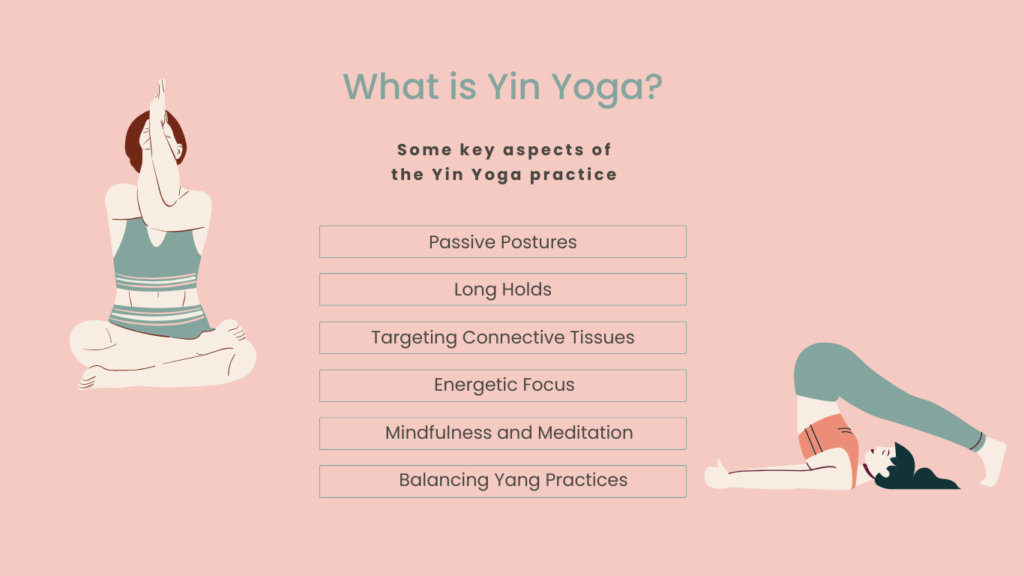
A Yin Yoga teachers training is a specialized program designed to equip yoga practitioners with the knowledge, skills, and certification required to teach Yin Yoga.
The Yin Yoga teacher training covers the philosophical foundations of Yin Yoga, including its roots in Indian and Taoist principles and traditional Chinese medicine (TCM). Concepts such as the balance between Yin and Yang energies, the role of meridians (energy channels), and the importance of stillness are explored. Participants learn the key principles of Yin Yoga, including the concepts of finding an appropriate edge in each pose, cultivating stillness, and holding poses for extended periods.
A Yin Yoga instructor training covers the anatomy and physiology relevant to Yin Yoga, with a particular focus on the connective tissues—fascia, ligaments, tendons and fascia—and their role in maintaining flexibility and joint mobility. In our 50 hour Yin Yoga teacher training Germany we also put a focus on the nervous system as well as hip and spine anatomy.
The Yin Yoga training provides detailed instruction on various Yin Yoga postures, including their alignment, modifications, and the use of props. Each pose is studied to understand its benefits, target areas, and energetic effects. The trainees learn how to design effective Yin Yoga classes, taking into account the flow of energy through the body, the meridian lines, and the balance between different postures.
Students are taught how to structure a Yin Yoga class, including setting an intention, introducing a specific theme and ensuring a balanced experience for students. Effective teaching also involves learning how to cue students into poses, guide them through the experience, and create a calming, meditative environment.
Since Yin Yoga is closely linked with mindfulness and meditation, yoga teacher training often includes practices for integrating these elements into a Yin Yoga class. This can involve breathing and pranayama techniques, guided meditation and concentration practices. Teachers are trained to embody mindfulness in their teaching, creating a safe and supportive environment for students to explore their own inner experiences.
Some Yin Yoga teacher training programs incorporate teachings from TCM, focusing on the meridian lines (energy pathways) and how different poses can influence the flow of energy in the body. In addition to TCM, trainees may learn about the chakra system and how Yin Yoga can support energetic balance through specific poses and sequences.
A YTT 2026 (Yoga Teacher training) always provides an opportunity for participants to deepen their own Yin Yoga practice, experiencing firsthand the benefits and challenges of the long-held poses. Reflection on personal growth, teaching philosophy, and the impact of Yin Yoga on one’s own life is a key component for teaching Yin Yoga.
Upon successful completion of the Yin yoga teacher training, participants typically receive a certification that qualifies them to teach Yin Yoga classes. The certification is often recognized by major yoga alliances or organizations. Many programs encourage ongoing learning and offer Yin Yoga as specialized modules for those who wish to continue deepening their knowledge and teaching skills, thus are part of the YACEP of Yoga Alliance.
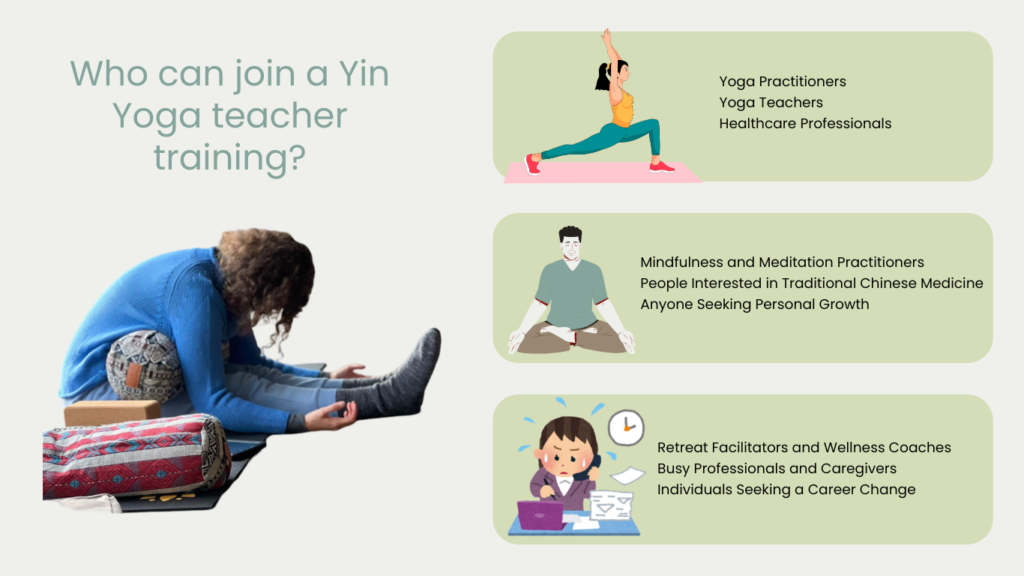
A Yin Yoga teacher training is open to a wide range of individuals, from those with a deep passion for Yoga to those looking to broaden their teaching skills or deepen their personal practice.
Individuals who regularly practice Yoga and want to explore the deeper, meditative aspects of Yin Yoga can join to enhance their personal practice and understanding of the body-mind connection. While prior Yoga experience can be helpful, some Yin Yoga teacher trainings are open to beginners who are dedicated to learning and personal growth.
Certified Yoga teachers from any discipline join a Yin Yoga teacher training and benefit from it by adding a new dimension to their teaching repertoire. It’s especially valuable for those who primarily teach more dynamic, yang-style yoga and want to offer a complementary practice. For Yoga teachers looking to fulfill continuing education requirements, a Yin Yoga teacher training can provide the necessary hours and new skills.
Healthcare professionals, such as physical therapists, massage therapists, occupational therapists, or psychologists may find a Yin Yoga training useful in understanding the benefits of deep tissue release and relaxation techniques, which can be applied in their practice.
Those who practice or teach mindfulness and meditation can use Yin Yoga as a way to integrate these practices with gentle movement, enhancing the mind-body connection.
Individuals interested in TCM, or energy healing may find a Yin Yoga teacher training valuable for understanding how the practice aligns with meridian theory and the flow of energy in the body.
A Yin Yoga teacher training is not just for those who want to teach; it’s also for everyone seeking personal transformation, healing, and a deeper understanding of themselves. The trainings often include introspective practices, self-reflection, and emotional release.
Wellness coaches, life coaches, and retreat facilitators can incorporate Yin Yoga into their offerings to provide a balanced, restorative experience for clients.
Professionals and caregivers who are interested in learning more about stress relief, self-care, and relaxation techniques can benefit from the training, even if they don’t plan to teach, as it provides the perfect balance for their busy life-style.
Those looking to transition into a new career in Yoga, wellness, or holistic health can use a 50 Hour Yin Yoga teacher training as a stepping stone towards that goal.
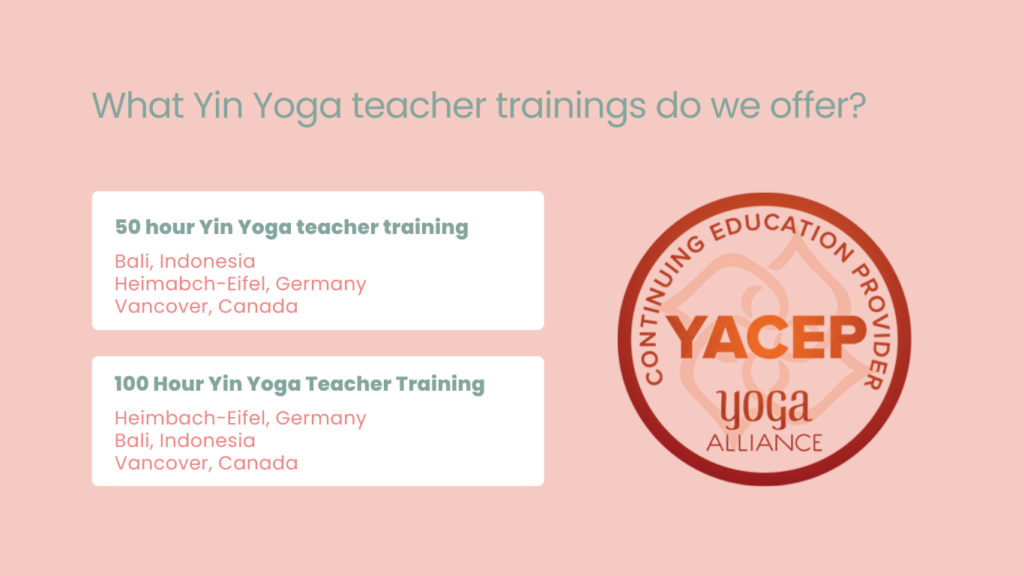
At Anandam Yoga School we are offering Yin Yoga teacher trainings in Europe and 50 hour Yin Yoga Teacher Training in Bali, they are part of the YACEP of Yoga Alliance and can be added to the continuous education hours if you are already a Yoga teacher. If you are not a Yoga teacher yet, you can still join our Yin Yoga training, receive Yoga Alliance certification and teach Yin Yoga afterwards.
Right now, our Yin Yoga trainings are 50 hour Yin Yoga teacher trainings in Bali and 50 hour Yin Yoga teacher trainings in Germany.
Our Yin Yoga teacher training Bali takes place on the west coast of Bali two minutes away from the black-sand beach in Canggu.
In Germany we offer our Yin Yoga teacher training in Heimbach-Eifel, in the north of the serene Eifel National Park.
We are also in the conception phase of a new 100 hour Yin Yoga teacher training, where we will dive even deeper into the philosophy of Yin Yoga, cover more Yin Yoga asanas and explore the effects of the practice on a deeper level.
If you would like to stay updated about our upcoming courses subscribe for our newsletter and be the first one to know when this 100 hour Yin Yoga teacher training is available.
Popular Courses in Bali
200 hour Yoga Teacher Training in Bali | 300 hour Yoga Teacher Training in Bali | 500 hour Yoga Teacher Training in Bali | 50 Hours Yin Yoga Training in Bali | 50 hours Pranayama Training in Bali | 50 hours Yoga Nidra Training Bali | 50 hours Arm Balancing Training Bali | 100 hour Ashtanga Training Bali
Popular Courses in Germany
200 hour Yoga Teacher Training in Germany | 300 hour Yoga Teacher Training Germany | 50 Hour Yin Yoga Training Germany | 50 Hour Pranayama Training Germany | 50 hour Yoga Nidra Training Germany | 50 Hour Arm Balancing Training | 100 hour Ashtanga Training Germany